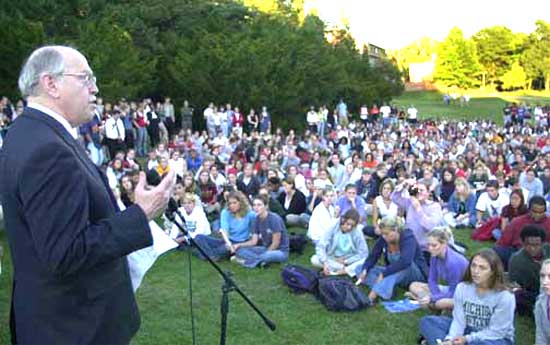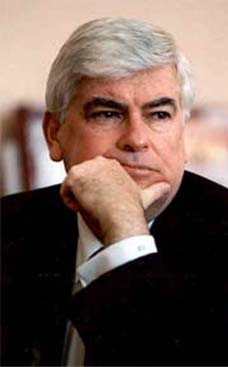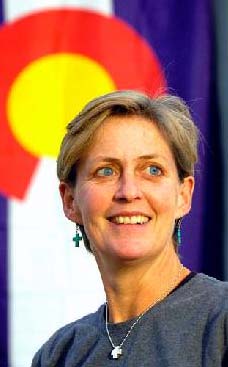
Paul Bremer and his chief economic adviser, Peter McPherson, didn't want to pour money into inefficient state-run firms. They believed private investors would buy Iraq's government factories and set up new businesses to employ the populace. So they refused to give Carney money to reopen the plants. The day before he left, Carney sent a note to McPherson titled "Fatal Flaws in Budget Policy towards State-Owned Enterprises." He argued that the CPA was violating the Geneva Conventions by undermining "assets of the Iraqi people." He also accused McPherson of drawing up policy "without adequate Iraqi participation." Petraeus also opposed the immediate privatization of state-run firms. "What happens when you have privatization is ... you end up with a hell of a lot less workers in the short term," he said in 2004. "If you want to increase unemployment en route to greater employment and greater productivity and greater a lot of other things, that's great, but you've got to survive in the short term." For almost three years, the policy didn't change. Although the Iraqi government reopened a few of its 148 factories and began operating them at a diminished capacity, the efforts to sell them to private investors were unsuccessful. Former Michigan State University President Peter McPherson served as a Peace Corps Volunteer in Peru in the 1960's.
Timothy Carney says Peter McPherson believed private investors would buy Iraq's government factories and set up new businesses to employ the populace
Dissenters become assets in White House's new plan for Iraq
By Rajiv Chandrasekaran
The Washington Post
WASHINGTON — Timothy Carney went to Baghdad in April 2003 to run Iraq's Ministry of Industry and Minerals. Unlike many of his compatriots in the Green Zone, the rangy, retired U.S. ambassador wasn't fazed by chaos.
He'd been in Saigon during the Tet Offensive, Phnom Penh as it was falling to the Khmer Rouge, and Mogadishu in the throes of Somalia's civil war. He disregarded security edicts and drove around Baghdad without a military escort. His mission, as he put it, "was to listen to the Iraqis and work with them."
He left after two months, disgusted and disillusioned. The U.S. occupation administration in Iraq, the Coalition Provisional Authority (CPA), had placed ideology over pragmatism, he believed. His boss, Paul Bremer, refused to pay for repairs needed to reopen many looted state-owned factories, even though they had employed tens of thousands of Iraqis. Carney spent his days screening workers for ties to the Baath party.
"Planning was bad," he wrote in his diary May 8, "but implementation is worse."
When he returned to Washington, D.C., he made little secret of his views. They were so scathing that his wife lost a government contract.
He figured his days of working on Iraq were over, until Tuesday, when David Satterfield, the State Department's Iraq coordinator, asked Carney if he'd be willing to go back to Baghdad as the coordinator of the reconstruction effort.
[Excerpt]
Providing jobs
Before Carney left Iraq in June 2003, he tried one last time to persuade Bremer to rethink his refusal to repair more than a few state-owned factories. Iraq's government-run businesses employed more than 100,000 people before the U.S. invasion. To Carney, it was vital: Fixing the factories would allow thousands of Iraqis to get back to work, allowing them to provide for their families and keeping them occupied. He knew from his time in other post-conflict societies that the idle are the best recruits for insurgencies.
But Bremer and his chief economic adviser, Peter McPherson, didn't want to pour money into inefficient state-run firms. They believed private investors would buy Iraq's government factories and set up new businesses to employ the populace. So they refused to give Carney money to reopen the plants.
The day before he left, Carney sent a note to McPherson titled "Fatal Flaws in Budget Policy towards State-Owned Enterprises." He argued that the CPA was violating the Geneva Conventions by undermining "assets of the Iraqi people." He also accused McPherson of drawing up policy "without adequate Iraqi participation."
Petraeus also opposed the immediate privatization of state-run firms.
"What happens when you have privatization is ... you end up with a hell of a lot less workers in the short term," he said in 2004. "If you want to increase unemployment en route to greater employment and greater productivity and greater a lot of other things, that's great, but you've got to survive in the short term."
For almost three years, the policy didn't change. Although the Iraqi government reopened a few of its 148 factories and began operating them at a diminished capacity, the efforts to sell them to private investors were unsuccessful.
When Lt. Gen. Peter Chiarelli, then the top U.S. field commander in Iraq, sought to increase production at a state-owned tractor factory south of Baghdad early last year, a State Department official in Baghdad refused to pay for the necessary repairs, even though the rehabilitated facility would have been able to provide employment for many of the 10,000 people who worked there before the invasion. Chiarelli used money from a different program to pay for it.
It wasn't until June that the Bush administration began to re-evaluate its approach. Paul Brinkley, who had recently taken over as deputy undersecretary of defense for business transformation, returned from a trip to Iraq convinced that quelling violence depended on increasing employment. To Brinkley, a former corporate executive, the most effective way to create jobs was to reopen state-run factories.
Brinkley persuaded Deputy Defense Secretary Gordon England to authorize money for the repair of as many as 200 factories. England's predecessor, Paul Wolfowitz, was among the administration officials who opposed resuscitating state-owned firms in 2003.
It's unclear how effective Brinkley's initiative will be. Many of the factories are in dangerous, Sunni-dominated areas. Electricity remains in short supply. Raw materials can be hard to get. And given the intensity of the sectarian conflict, giving Iraqis jobs may not be enough to get them to put down their weapons.
Brinkley's team is focusing on 10 factories that it thinks could be open and employing more than 11,000 Iraqis by the end of this month.


















